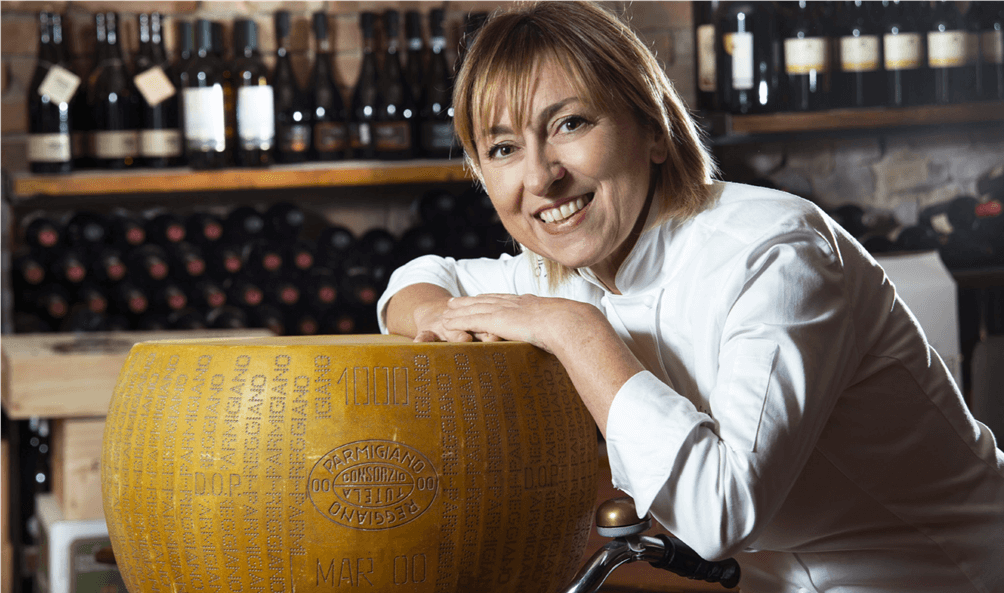“OSTERIA DI FORNIO: a 100-year-old establishment in the small town of Fornio. Just past the entrance, the kitchen is visible. Chef Cristina and her team are visible behind the glass: forgotten recipes, the flavours of Emilia Romagna’s culinary tradition, and a careful eye on seasonal and local products.”

Emilia-Romagna is deservedly known as the “land of flavour” thanks to its unparalleled variety combined with its ancient culinary tradition. The Osteria di Fornio is dedicated to the rediscovery of a tradition which otherwise risks being lost.
The restaurant’s dining room reflects the cuisine of chef Cristina Cerbi: it is well-groomed, modern, and dynamic.
But the real magic is revealed on the lower level: an ancient stone cellar for ageing cured meats. It’s there that the chef tells about her osteria.
Chef Cerbi, how would you describe your cooking style in just a few words?
I would choose these: authentic, traditional, genuine, and, it goes without saying, quality. We’re third generation restaurant owners of a historic establishment that dates back to 1928, in a region whose essence is flavour.
My cooking style was born here and is based on the study of traditional flavours, of recipes that have been passed down and rediscovered, to represent the soul of a region whose true values are rooted in the wealth of its agricultural patrimony.
We make a constant choice to maintain the recipes and raw ingredients of Parma’s culinary tradition, but we reinterpret and enhance them with our imaginations, always in full respect of the authenticity and seasonal nature of the products we use.
Do your clients respond to this strong connection to tradition? Have you noticed any changes in trends?
There is definitely a response, and one of the interesting trends that I increasingly see asserting itself has to do with identity. Future restaurants will have strong identities, increasingly connected to the concept of brand positioning: who am I and what makes me stand out from the others?
Even a historic restaurant like ours will need to be increasingly identifiable and able to clearly express its concept of food, also and especially via internet and social networks. Cooking well is a starting point.
Conveying how and according to what philosophy one cooks, is incredibly important, especially from the perspective of marketing. The story of a place must be told in order for that place to be understood.

Other than food, what’s your story about?
Definitely raw ingredients. We work in a generous region and for this reason too, we carefully select our suppliers. Approximately 80% of our suppliers are local businesses, with whom we’ve established a relationship based on mutual trust, something which allows us to work better and without stress.
Especially during this period, we’ve realized how important personal relationships are, as well as mutual support.
In terms of equipment, what’s your philosophy?
In our restaurant, there’s an increasing focus on energy efficiency and on sustainability in general. So our tendency is to replace all obsolete equipment with “more intelligent”, innovate, and environmentally friendly equipment, not only in terms of cooking, but also from the perspective of cleaning and maintenance.
How do you see your future and that of the restaurant industry?
Even before Covid there was a change taking place in the restaurant industry, which Covid then accelerated.
People are gravitating towards a more genuine and less superficial style, towards quality that focuses on local products and fresh raw ingredients. Simple, yet not makeshift, restaurants that are well-studied and innovative. We believe in a cooking style that exalts the ingredients, but which is also light and flavourful.
It will also be important to hone those aspects related to technology in order to optimize costs in terms of sustainability and perfect digital communication. Investments and developments will definitely continue to be made in take-away.

